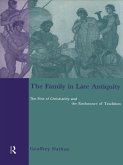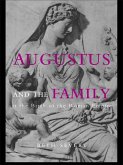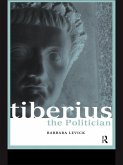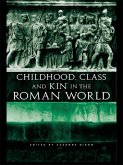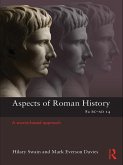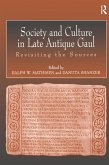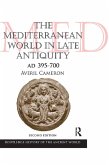Geoffrey Nathan
The Family in Late Antiquity (eBook, ePUB)
The Rise of Christianity and the Endurance of Tradition
56,95 €
56,95 €
inkl. MwSt.
Sofort per Download lieferbar

28 °P sammeln
56,95 €
Als Download kaufen

56,95 €
inkl. MwSt.
Sofort per Download lieferbar

28 °P sammeln
Jetzt verschenken
Alle Infos zum eBook verschenken
56,95 €
inkl. MwSt.
Sofort per Download lieferbar
Alle Infos zum eBook verschenken

28 °P sammeln
Geoffrey Nathan
The Family in Late Antiquity (eBook, ePUB)
The Rise of Christianity and the Endurance of Tradition
- Format: ePub
- Merkliste
- Auf die Merkliste
- Bewerten Bewerten
- Teilen
- Produkt teilen
- Produkterinnerung
- Produkterinnerung

Bitte loggen Sie sich zunächst in Ihr Kundenkonto ein oder registrieren Sie sich bei
bücher.de, um das eBook-Abo tolino select nutzen zu können.
Hier können Sie sich einloggen
Hier können Sie sich einloggen
Sie sind bereits eingeloggt. Klicken Sie auf 2. tolino select Abo, um fortzufahren.

Bitte loggen Sie sich zunächst in Ihr Kundenkonto ein oder registrieren Sie sich bei bücher.de, um das eBook-Abo tolino select nutzen zu können.
In this timely book, Geoffrey Nathan offers a well structured and well documented examination of the family in late antiquity, with particular emphasis on the areas of Italy and Gaul and the phenomenon of Christianisation.
- Geräte: eReader
- mit Kopierschutz
- eBook Hilfe
- Größe: 0.71MB
Andere Kunden interessierten sich auch für
![The Family in Late Antiquity (eBook, PDF) The Family in Late Antiquity (eBook, PDF)]() Geoffrey NathanThe Family in Late Antiquity (eBook, PDF)56,95 €
Geoffrey NathanThe Family in Late Antiquity (eBook, PDF)56,95 €![Augustus and the Family at the Birth of the Roman Empire (eBook, ePUB) Augustus and the Family at the Birth of the Roman Empire (eBook, ePUB)]() Beth SeveryAugustus and the Family at the Birth of the Roman Empire (eBook, ePUB)57,95 €
Beth SeveryAugustus and the Family at the Birth of the Roman Empire (eBook, ePUB)57,95 €![Tiberius the Politician (eBook, ePUB) Tiberius the Politician (eBook, ePUB)]() Barbara LevickTiberius the Politician (eBook, ePUB)40,95 €
Barbara LevickTiberius the Politician (eBook, ePUB)40,95 €![Childhood, Class and Kin in the Roman World (eBook, ePUB) Childhood, Class and Kin in the Roman World (eBook, ePUB)]() Childhood, Class and Kin in the Roman World (eBook, ePUB)53,95 €
Childhood, Class and Kin in the Roman World (eBook, ePUB)53,95 €![Aspects of Roman History 82BC-AD14 (eBook, ePUB) Aspects of Roman History 82BC-AD14 (eBook, ePUB)]() Mark DaviesAspects of Roman History 82BC-AD14 (eBook, ePUB)40,95 €
Mark DaviesAspects of Roman History 82BC-AD14 (eBook, ePUB)40,95 €![Society and Culture in Late Antique Gaul (eBook, ePUB) Society and Culture in Late Antique Gaul (eBook, ePUB)]() Ralph MathisenSociety and Culture in Late Antique Gaul (eBook, ePUB)54,95 €
Ralph MathisenSociety and Culture in Late Antique Gaul (eBook, ePUB)54,95 €![The Mediterranean World in Late Antiquity (eBook, ePUB) The Mediterranean World in Late Antiquity (eBook, ePUB)]() Averil CameronThe Mediterranean World in Late Antiquity (eBook, ePUB)46,95 €
Averil CameronThe Mediterranean World in Late Antiquity (eBook, ePUB)46,95 €-
-
-
In this timely book, Geoffrey Nathan offers a well structured and well documented examination of the family in late antiquity, with particular emphasis on the areas of Italy and Gaul and the phenomenon of Christianisation.
Dieser Download kann aus rechtlichen Gründen nur mit Rechnungsadresse in A, B, BG, CY, CZ, D, DK, EW, E, FIN, F, GR, HR, H, IRL, I, LT, L, LR, M, NL, PL, P, R, S, SLO, SK ausgeliefert werden.
Produktdetails
- Produktdetails
- Verlag: Taylor & Francis eBooks
- Seitenzahl: 288
- Erscheinungstermin: 8. Januar 2002
- Englisch
- ISBN-13: 9781134706686
- Artikelnr.: 42669902
- Verlag: Taylor & Francis eBooks
- Seitenzahl: 288
- Erscheinungstermin: 8. Januar 2002
- Englisch
- ISBN-13: 9781134706686
- Artikelnr.: 42669902
- Herstellerkennzeichnung Die Herstellerinformationen sind derzeit nicht verfügbar.
Dr Geoffrey Nathan is a lecturer in Roman History a the University of California at Los Angeles. He has published numerous articles on late antiquity in learned journals.
1: Introduction Introduction Scope of Study
Definitions and Models
Plan of Study
The Sources 2: Two Traditions The Roman Family
Marriage
Divorce Widowhood and Remarriage
Children
Half-Siblings
Step-Siblings and Other Children
Extended Family
Slaves and Freemen
Discipline
Conclusions
Christianity and the Family
Early Christian Thought
Early Evidence of the Family in Christianity 3: Constantine and the Confluence of Two Traditions Prologue: Legal Developments in the Third Century
Constantine and the New World Order
Constantine's Social Legislation
Introduction
The Married State
Children and Family
Slave Familia and Familiae
Conclusions 4: Marriage Introduction
Marriage
Augustine with Secular and Christian Thought
Contracting a Marriage: the Example of Honorius and Maria
Disconnects: Canon and Imperial Law
The Negative Example: Melania the Younger and Pinian
Problems in Marriage
Adultery
Domestic Violence
Conclusions 5: Alternatives to Marriage Divorce
Divorce and the Church
Divorce and the Law
Divorce in Practice
Widowhood and Remarriage
Church Encouragement
Choosing Widowhood
Remarriage
Legal Issues Surrounding Widowhood and Remarriage
Other States
Concubinage
Virginity
Conclusions 6: Children The Child
A New Status?
Making it to Adulthood
Children and Education
The Child in the Family
Fathers and their Children
Mothers and their Children
Domestic Help
Adult Children
Conclusions 7: The Extended Family Introduction
Two Extended families
Conclusions 8: Household Slaves Domestics
Christian Thought and Institutional Constructs
The Church as a Mediating Influence
The Church as a Supporter of Slavery
Legal Changes
Slaves in the Domus
Slaves as Victims
Slave Anger
Freedmen and Women
Conclusions 9: Final Thoughts Appendix Notes References
Definitions and Models
Plan of Study
The Sources 2: Two Traditions The Roman Family
Marriage
Divorce Widowhood and Remarriage
Children
Half-Siblings
Step-Siblings and Other Children
Extended Family
Slaves and Freemen
Discipline
Conclusions
Christianity and the Family
Early Christian Thought
Early Evidence of the Family in Christianity 3: Constantine and the Confluence of Two Traditions Prologue: Legal Developments in the Third Century
Constantine and the New World Order
Constantine's Social Legislation
Introduction
The Married State
Children and Family
Slave Familia and Familiae
Conclusions 4: Marriage Introduction
Marriage
Augustine with Secular and Christian Thought
Contracting a Marriage: the Example of Honorius and Maria
Disconnects: Canon and Imperial Law
The Negative Example: Melania the Younger and Pinian
Problems in Marriage
Adultery
Domestic Violence
Conclusions 5: Alternatives to Marriage Divorce
Divorce and the Church
Divorce and the Law
Divorce in Practice
Widowhood and Remarriage
Church Encouragement
Choosing Widowhood
Remarriage
Legal Issues Surrounding Widowhood and Remarriage
Other States
Concubinage
Virginity
Conclusions 6: Children The Child
A New Status?
Making it to Adulthood
Children and Education
The Child in the Family
Fathers and their Children
Mothers and their Children
Domestic Help
Adult Children
Conclusions 7: The Extended Family Introduction
Two Extended families
Conclusions 8: Household Slaves Domestics
Christian Thought and Institutional Constructs
The Church as a Mediating Influence
The Church as a Supporter of Slavery
Legal Changes
Slaves in the Domus
Slaves as Victims
Slave Anger
Freedmen and Women
Conclusions 9: Final Thoughts Appendix Notes References
Acknowledgements Abbreviations 1: Introduction Introduction Scope of Study, Definitions and Models, Plan of Study, The Sources 2: Two Traditions The Roman Family, Marriage, Divorce Widowhood and Remarriage, Children, Half-Siblings, Step-Siblings and Other Children, Extended Family, Slaves and Freemen, Discipline, Conclusions, Christianity and the Family, Early Christian Thought, Early Evidence of the Family in Christianity 3: Constantine and the Confluence of Two Traditions Prologue: Legal Developments in the Third Century, Constantine and the New World Order, Constantine's Social Legislation, Introduction, The Married State, Children and Family, Slave Familia and Familiae , Conclusions 4: Marriage Introduction, Marriage, Augustine with Secular and Christian Thought, Contracting a Marriage: the Example of Honorius and Maria, Disconnects: Canon and Imperial Law, The Negative Example: Melania the Younger and Pinian, Problems in Marriage, Adultery, Domestic Violence, Conclusions 5: Alternatives to Marriage Divorce, Divorce and the Church, Divorce and the Law, Divorce in Practice, Widowhood and Remarriage, Church Encouragement, Choosing Widowhood, Remarriage, Legal Issues Surrounding Widowhood and Remarriage, Other States, Concubinage, Virginity, Conclusions 6: Children The Child, A New Status?, Making it to Adulthood, Children and Education, The Child in the Family, Fathers and their Children, Mothers and their Children, Domestic Help, Adult Children, Conclusions 7: The Extended Family Introduction, Two Extended families, Conclusions 8: Household Slaves Domestics, Christian Thought and Institutional Constructs, The Church as a Mediating Influence, The Church as a Supporter of Slavery, Legal Changes, Slaves in the Domus, Slaves as Victims, Slave Anger, Freedmen and Women, Conclusions 9: Final Thoughts Appendix Notes References
1: Introduction Introduction Scope of Study
Definitions and Models
Plan of Study
The Sources 2: Two Traditions The Roman Family
Marriage
Divorce Widowhood and Remarriage
Children
Half-Siblings
Step-Siblings and Other Children
Extended Family
Slaves and Freemen
Discipline
Conclusions
Christianity and the Family
Early Christian Thought
Early Evidence of the Family in Christianity 3: Constantine and the Confluence of Two Traditions Prologue: Legal Developments in the Third Century
Constantine and the New World Order
Constantine's Social Legislation
Introduction
The Married State
Children and Family
Slave Familia and Familiae
Conclusions 4: Marriage Introduction
Marriage
Augustine with Secular and Christian Thought
Contracting a Marriage: the Example of Honorius and Maria
Disconnects: Canon and Imperial Law
The Negative Example: Melania the Younger and Pinian
Problems in Marriage
Adultery
Domestic Violence
Conclusions 5: Alternatives to Marriage Divorce
Divorce and the Church
Divorce and the Law
Divorce in Practice
Widowhood and Remarriage
Church Encouragement
Choosing Widowhood
Remarriage
Legal Issues Surrounding Widowhood and Remarriage
Other States
Concubinage
Virginity
Conclusions 6: Children The Child
A New Status?
Making it to Adulthood
Children and Education
The Child in the Family
Fathers and their Children
Mothers and their Children
Domestic Help
Adult Children
Conclusions 7: The Extended Family Introduction
Two Extended families
Conclusions 8: Household Slaves Domestics
Christian Thought and Institutional Constructs
The Church as a Mediating Influence
The Church as a Supporter of Slavery
Legal Changes
Slaves in the Domus
Slaves as Victims
Slave Anger
Freedmen and Women
Conclusions 9: Final Thoughts Appendix Notes References
Definitions and Models
Plan of Study
The Sources 2: Two Traditions The Roman Family
Marriage
Divorce Widowhood and Remarriage
Children
Half-Siblings
Step-Siblings and Other Children
Extended Family
Slaves and Freemen
Discipline
Conclusions
Christianity and the Family
Early Christian Thought
Early Evidence of the Family in Christianity 3: Constantine and the Confluence of Two Traditions Prologue: Legal Developments in the Third Century
Constantine and the New World Order
Constantine's Social Legislation
Introduction
The Married State
Children and Family
Slave Familia and Familiae
Conclusions 4: Marriage Introduction
Marriage
Augustine with Secular and Christian Thought
Contracting a Marriage: the Example of Honorius and Maria
Disconnects: Canon and Imperial Law
The Negative Example: Melania the Younger and Pinian
Problems in Marriage
Adultery
Domestic Violence
Conclusions 5: Alternatives to Marriage Divorce
Divorce and the Church
Divorce and the Law
Divorce in Practice
Widowhood and Remarriage
Church Encouragement
Choosing Widowhood
Remarriage
Legal Issues Surrounding Widowhood and Remarriage
Other States
Concubinage
Virginity
Conclusions 6: Children The Child
A New Status?
Making it to Adulthood
Children and Education
The Child in the Family
Fathers and their Children
Mothers and their Children
Domestic Help
Adult Children
Conclusions 7: The Extended Family Introduction
Two Extended families
Conclusions 8: Household Slaves Domestics
Christian Thought and Institutional Constructs
The Church as a Mediating Influence
The Church as a Supporter of Slavery
Legal Changes
Slaves in the Domus
Slaves as Victims
Slave Anger
Freedmen and Women
Conclusions 9: Final Thoughts Appendix Notes References
Acknowledgements Abbreviations 1: Introduction Introduction Scope of Study, Definitions and Models, Plan of Study, The Sources 2: Two Traditions The Roman Family, Marriage, Divorce Widowhood and Remarriage, Children, Half-Siblings, Step-Siblings and Other Children, Extended Family, Slaves and Freemen, Discipline, Conclusions, Christianity and the Family, Early Christian Thought, Early Evidence of the Family in Christianity 3: Constantine and the Confluence of Two Traditions Prologue: Legal Developments in the Third Century, Constantine and the New World Order, Constantine's Social Legislation, Introduction, The Married State, Children and Family, Slave Familia and Familiae , Conclusions 4: Marriage Introduction, Marriage, Augustine with Secular and Christian Thought, Contracting a Marriage: the Example of Honorius and Maria, Disconnects: Canon and Imperial Law, The Negative Example: Melania the Younger and Pinian, Problems in Marriage, Adultery, Domestic Violence, Conclusions 5: Alternatives to Marriage Divorce, Divorce and the Church, Divorce and the Law, Divorce in Practice, Widowhood and Remarriage, Church Encouragement, Choosing Widowhood, Remarriage, Legal Issues Surrounding Widowhood and Remarriage, Other States, Concubinage, Virginity, Conclusions 6: Children The Child, A New Status?, Making it to Adulthood, Children and Education, The Child in the Family, Fathers and their Children, Mothers and their Children, Domestic Help, Adult Children, Conclusions 7: The Extended Family Introduction, Two Extended families, Conclusions 8: Household Slaves Domestics, Christian Thought and Institutional Constructs, The Church as a Mediating Influence, The Church as a Supporter of Slavery, Legal Changes, Slaves in the Domus, Slaves as Victims, Slave Anger, Freedmen and Women, Conclusions 9: Final Thoughts Appendix Notes References

